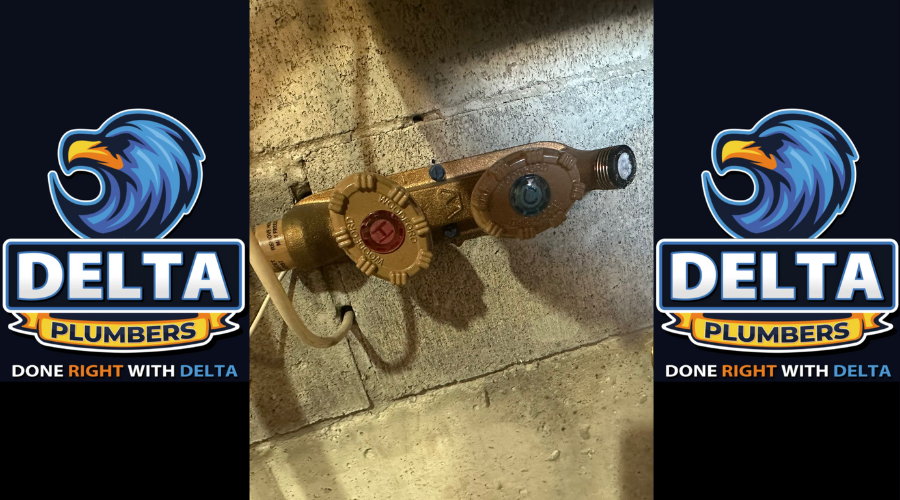Ontario’s diverse climate and architectural landscape present unique challenges for homeowners, particularly concerning plumbing systems. From the frigid winters that can freeze pipes to the aging infrastructure in historic homes, understanding and addressing these issues is crucial. This comprehensive guide delves into why Ontario homes require specialized plumbing care, covering essential topics such as the necessity of professional plumbers, the legality of DIY plumbing, the community benefits of quality plumbing, and the current state of the plumbing profession in Ontario.

Picture Source – Delta Plumbers
Does Ontario Need Plumbers?
Ontario’s unique environmental and structural factors make professional plumbers indispensable. The province experiences a wide range of temperatures, with harsh winters that can lead to frozen pipes and potential bursts. Additionally, many homes, especially in cities like Toronto and Ottawa, are aging and may have outdated plumbing systems prone to leaks and other issues. Professional plumbers possess the expertise to diagnose and address these problems effectively, ensuring the safety and functionality of residential plumbing systems.
Common Plumbing Issues in Ontario Homes
1. Frozen Pipes:
During winter, uninsulated pipes can freeze, leading to bursts and significant water damage.
2. Low Water Pressure:
Often caused by pipe corrosion, leaks, or sediment build-up, leading to inefficient water flow.
3. Leaky Faucets:
A common issue that can result in water wastage and increased utility bills.
4. Clogged Drains:
Accumulation of debris can lead to blockages, causing backups and potential damage.
5. Aging Infrastructure:
Older homes may have outdated plumbing materials like lead or galvanized pipes, which can pose health risks and are prone to corrosion.
Addressing these issues requires the skills of licensed professionals familiar with Ontario’s building codes and environmental factors.
Also Read: The Health Risks of Ignoring Plumbing Leaks

Picture Source – Delta Plumbers
Are You Allowed to Do Your Plumbing in Ontario?
In Ontario, homeowners are permitted to perform certain plumbing tasks on their property. However, it’s essential to understand the scope and limitations of DIY plumbing to ensure safety and compliance with local regulations.
Permissible DIY Plumbing Tasks
- Minor Repairs: Tasks such as fixing a leaky faucet, replacing showerheads, or unclogging drains are generally acceptable for homeowners to undertake.
- Fixture Replacements: Swapping out existing fixtures like sinks or toilets, provided there are no modifications to the existing plumbing system.
Tasks Requiring a Licensed Professional
- Major Installations or Modifications: Any work involving changes to the plumbing system, such as installing new pipes, altering pipe routes, or working on the main water supply, typically requires a licensed plumber.
- Work Requiring Permits: Significant plumbing work often necessitates permits to ensure compliance with the Ontario Building Code. Licensed plumbers are familiar with these requirements and can secure the necessary permits.
It’s crucial to note that while DIY projects can be cost-effective, improper plumbing work can lead to severe issues, including water damage, health hazards, and non-compliance with local codes. Therefore, for complex tasks, hiring a licensed professional is highly recommended.
Also Read: Is It Time to Replace Your Old Pipes? Signs to Look For

Picture Source – Delta Plumbers
How Does Plumbing Help the Community?
Quality plumbing extends beyond individual homes; it plays a vital role in promoting public health, environmental sustainability, and overall community well-being.
Public Health and Safety
- Clean Water Supply: Proper plumbing ensures the delivery of clean and safe drinking water, preventing waterborne diseases.
- Sanitation: Efficient waste removal systems prevent the spread of contaminants and maintain hygienic living conditions.
Environmental Sustainability
- Water Conservation: Modern plumbing systems and fixtures are designed to reduce water usage, conserving this precious resource.
- Energy Efficiency: Upgraded plumbing can lead to more efficient heating systems, reducing energy consumption and greenhouse gas emissions.
Economic Benefits
- Job Creation: The plumbing industry provides employment opportunities, contributing to the local economy.
- Property Value: Homes with well-maintained plumbing systems have higher property values and are more attractive to potential buyers.
In essence, quality plumbing is a cornerstone of a healthy, sustainable, and prosperous community.
Also Read: Benefits of Professional Plumbing Inspections

Picture Source – Delta Plumbers
Why Is Quality So Important in Plumbing?
Investing in quality plumbing is essential for several reasons, including safety, cost-effectiveness, and longevity.
Safety
- Preventing Water Damage: High-quality materials and professional installation reduce the risk of leaks and floods that can cause extensive property damage.
- Health Protection: Properly installed plumbing prevents contamination of the water supply, safeguarding residents from potential health hazards.
Cost-Effectiveness
- Reduced Maintenance Costs: Quality plumbing systems require fewer repairs, saving homeowners money in the long run.
- Energy Savings: Efficient plumbing reduces water and energy consumption, leading to lower utility bills.
Longevity
- Durability: High-quality materials and workmanship ensure that plumbing systems last longer, providing reliable service for years.
In summary, prioritizing quality in plumbing installations and repairs is a wise investment that enhances safety, efficiency, and property value.
Also Read: Benefits of Regular Water Heater Flushing

Picture Source – Delta Plumbers
How Much Does a Fully Licensed Plumber Make in Ontario?
The compensation for licensed plumbers in Ontario varies based on experience, location, and the complexity of the work.
Average Earnings
- Hourly Wage: On average, licensed plumbers in Ontario earn between $30 to $45 per hour.
- Annual Salary: This translates to an annual salary ranging from approximately $60,000 to $90,000, depending on hours worked and additional benefits.
Factors Influencing Earnings
- Experience: Seasoned plumbers with specialized skills or certifications can command higher wages.
- Location: Urban areas with higher living costs may offer higher wages to attract qualified professionals.
- Demand: Regions experiencing construction booms or with aging infrastructure may have increased demand for plumbers, potentially leading to higher pay.
Pursuing a career as a licensed plumber in Ontario offers a stable and rewarding income, with opportunities for growth and Advancement. Many plumbers eventually establish their businesses, increasing their earning potential significantly.
Also Read: How to Install a Frost-Free Faucet

Picture Source – Delta Plumbers
Is There a Shortage of Plumbers in Ontario?
Yes, Ontario is experiencing a shortage of skilled tradespeople, including plumbers. This shortage is driven by several factors, which make plumbing a lucrative career choice for those considering entering the trade.
Reasons for the Plumber Shortage in Ontario
- Retirement of Experienced Plumbers
- Many plumbers are reaching retirement age, creating a gap in the workforce that needs to be filled by younger tradespeople.
- Growing Construction Industry
- Ontario’s booming construction sector increases the demand for plumbing professionals to install and maintain water systems in new homes, commercial buildings, and infrastructure projects.
- Aging Infrastructure
- Many of Ontario’s older cities, including Toronto, Ottawa, and Hamilton, have aging plumbing systems that require maintenance, upgrades, or complete replacements, driving up demand for skilled plumbers.
- Lack of New Apprentices
- While plumbing is a high-paying and stable career, fewer young people are entering the trade, resulting in a shortage of qualified workers.
Opportunities for Aspiring Plumbers
Due to this shortage, becoming a plumber in Ontario presents significant career opportunities, including:
- Job Security – The high demand ensures steady employment.
- Competitive Salaries – A skilled plumber can negotiate better wages.
- Business Potential – Many plumbers start their own companies, increasing their earning potential.
If you’re considering a career in plumbing, now is the perfect time to enter the industry and take advantage of the growing demand for skilled professionals.
Also Read: Benefits of Insulating Your Pipes: A Complete Guide

Picture Source – Delta Plumbers
Can a Handyman Do Plumbing in Ontario?
In Ontario, handymen can perform minor plumbing work, but there are strict regulations governing the extent of their services. Major plumbing jobs must be handled by licensed professionals to ensure safety and compliance with provincial codes.
What Can a Handyman Legally Do?
- Fix minor leaks
- Replace faucets, showerheads, and toilets
- Unclog drains
- Install simple plumbing fixtures
What Requires a Licensed Plumber?
- Pipe Installations or Replacements – Any work involving water supply or drainage systems must be done by a licensed plumber.
- Sewer Line Repairs – Specialized knowledge and equipment are needed to handle sewer systems safely.
- Water Heater Installations – Improper installation can lead to serious safety hazards, including gas leaks or water damage.
- Backflow Prevention Devices – To ensure a clean water supply, these installations require certification.
Hiring a licensed plumber guarantees quality work that complies with Ontario’s plumbing regulations. Cutting corners by using an unqualified handyman for major plumbing projects can lead to code violations, insurance issues, and costly repairs.
Conclusion
Ontario homes require special plumbing care due to factors such as extreme weather conditions, aging infrastructure, and stringent building codes. While homeowners can perform minor plumbing repairs, hiring a licensed plumber ensures safety, compliance, and efficiency. The plumbing industry also plays a vital role in public health, environmental sustainability, and economic growth. With the current shortage of skilled plumbers, it is a promising career path with excellent job security and earning potential.
Whether you need plumbing services for your home or are considering a career in the trade, understanding Ontario’s plumbing regulations and the importance of professional expertise is crucial. At Delta Plumbers, we are committed to providing high-quality plumbing solutions tailored to the needs of Ontario homeowners. Contact us today for expert plumbing services that guarantee safety, efficiency, and long-lasting results!









